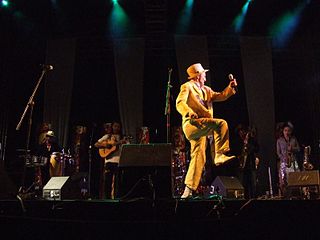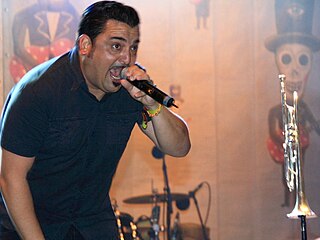Mambo is a genre of Cuban dance music pioneered by the charanga Arcaño y sus Maravillas in the late 1930s and later popularized in the big band style by Pérez Prado. It originated as a syncopated form of the danzón, known as danzón-mambo, with a final, improvised section, which incorporated the guajeos typical of son cubano. These guajeos became the essence of the genre when it was played by big bands, which did not perform the traditional sections of the danzón and instead leaned towards swing and jazz. By the late 1940s and early 1950s, mambo had become a "dance craze" in the United States as its associated dance took over the East Coast thanks to Pérez Prado, Tito Puente, Tito Rodríguez and others. In the mid-1950s, a slower ballroom style, also derived from the danzón, cha-cha-cha, replaced mambo as the most popular dance genre in North America. Nonetheless, mambo continued to enjoy some degree of popularity into the 1960s and new derivative styles appeared, such as dengue; by the 1970s it had been largely incorporated into salsa.
A descarga is an improvised jam session consisting of variations on Cuban music themes, primarily son montuno, but also guajira, bolero, guaracha and rumba. The genre is strongly influenced by jazz and it was developed in Havana during the 1950s. Important figures in the emergence of the genre were Cachao, Julio Gutiérrez, Bebo Valdés, Peruchín and Niño Rivera in Cuba, and Tito Puente, Machito and Mario Bauzá in New York. Originally, descargas were promoted by record companies such as Panart, Maype and Gema under the label Cuban jam sessions. From the 1960s, the descarga format was usually adapted by large salsa ensembles, most notably the Fania All-Stars.

The 4th Annual Latin Grammys were held in Miami at the American Airlines Arena on Wednesday, September 3, 2003. It was the first time the telecast was held outside of Los Angeles. Juanes was the night's biggest winner winning a record five awards including Album of the Year. He tied his own record winning five awards again five years later in 2008. Juan Luis Guerra and Calle 13 also tied this record in 2007 and 2009 respectively.
Alberto Naranjo [nah-rahn'-ho] is a musician. He was born Jorge Alberto Naranjo in Caracas, Venezuela. His mother, the singer Graciela Naranjo, was a radio, film and television pioneer in her homeland. Largely self-taught, Naranjo embarked on a similar musical course, becoming – like his mother – one of Venezuela's icons of contemporary popular music.
Oscar Hernández is an American pianist, arranger and producer of Puerto Rican descent.

Israel López Valdés, better known as Cachao, was a Cuban double bassist and composer. Cachao is widely known as the co-creator of the mambo and a master of the descarga. Throughout his career he also performed and recorded in a variety of music styles ranging from classical music to salsa. An exile in the United States since the 1960s, he only achieved international fame following a career revival in the 1990s.

The winners of the Second Annual Latin Grammy Awards were announced during a press conference on Tuesday, October 30, 2001 at the Conga Room in Los Angeles, California. The conference, which was broadcast live on the internet, was hosted by Jimmy Smits and Paul Rodriguez. Alejandro Sanz was the big winner winning four awards including Album of the Year. Juanes won three awards including Best New Artist.
Francisco Aguabella was an Afro-Cuban percussionist whose career spanned folk, jazz, and dance bands. He was a prolific session musician and recorded seven albums as a leader.
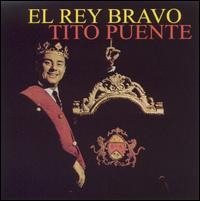
"Oye Como Va" is a song written by Latin jazz and mambo musician Tito Puente in 1962. Mexican-American rock group Santana's rendition further popularized the song, which reached number 13 on the Billboard Hot 100, number 11 on the Billboard Easy Listening survey, and number 32 on the R&B chart.
Alfredo Rodríguez was a Cuban pianist who played Afro-Cuban music as well as Latin jazz. Born in Havana, his musical career began in New York, where he struggled to establish himself, playing with dozens of Latin music groups over two decades. In 1983, he moved to Paris, where he enjoyed greater success, recording several albums as a leader to critical acclaim. In his later years, he founded a new group, los Acerekó, featuring Tata Güines, Changuito and Joel Hierrezuelo among others.
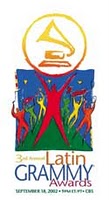
The 3rd Annual Latin Grammys were held in Los Angeles at the Kodak Theatre on Wednesday, September 18, 2002. Alejandro Sanz was the night's big winner winning a total of three awards including Album of the Year. The ceremony returned in style after the 2001 ceremony was cancelled because of the September 11, 2001 terrorist attacks across America, and all presenters apologized to viewers during the broadcast for such.
Jimmy Bosch, also known as "El Trombon Criollo", is a jazz and Salsa Music trombonist composer and bandleader of Puerto Rican descent born in Jersey City, New Jersey. Having performed since age eleven, by age thirteen he was playing in several local Latin music bands, "La Caliente", "Arco Iris", "La Sonica." While at Rutgers University studying classical music at age eighteen, he met Manny Oquendo and joined his band. He worked with Manny Oquendo on and off for over 20 years. Jimmy worked with Ray Barretto from the early 80's to early 90's. In 1996 he founded his own band "La Orquesta Jimmy Bosch", and has recorded four albums as a solo artist. Jimmy began working with Israel Cacaho in 1987, recorded and toured with Cachao also for over 20 years. Having recorded on over 100 recordings, Jimmy has toured with FANIA, Eddie Palmieri, Ruben Blades, Tipica Novel, Combinacion Perfecta, Pete El Conde Rodriguez, and so many more on a global level. Jimmy continues to tour as a solo artist and band leader imparting his years of experience with musicians all over the world. "La Orquesta Jimmy Bosch" and Jimmy Bosch y su Sexteto de Otro Mundo" continues to tour globally.
Carlos Valdés, better known as Patato, was a Cuban-born American conga player. In 1954 he emigrated from La Habana to New York City where he continued his prolific career as a sideman for several jazz and Latin music ensembles, and occasionally as a bandleader. He invented and patented the tunable conga drum which revolutionized the use of the instrument in the US. Tito Puente once called him "the greatest conguero alive today".

Rebeca Mauleón is an American pianist, composer, arranger and writer, specializing in salsa and other Latin American and Afro-Caribbean music.
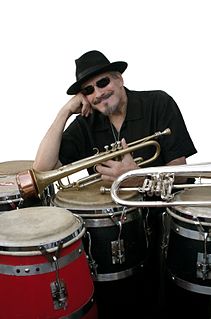
Jerry González was an American bandleader, trumpeter and percussionist of Puerto Rican descent. Together with his brother, bassist Andy González, he played an important role in the development of Latin jazz during the late 20th century. During the 1970s, both played alongside Eddie Palmieri and in Manny Oquendo's Conjunto Libre, and from 1980 to 2018 they directed The Fort Apache Band. From 2000 to 2018, Jerry González resided in Madrid, where he fronted Los Piratas del Flamenco and El Comando de la Clave. In October 2018, he died of a heart attack after a fire in his home in Madrid.
Canelita Medina is a Venezuelan salsa singer noted for singing in the Cuban Son style. She had always dreamt of becoming a singer as a young girl, imitating the salsa singer Celia Cruz. When she entered a radio talent program on Radio Continente, she caught the attention of talent agents with her unique voice. Over the years, Canelita has achieved great success, both nationally and internationally, and is successful to this day. Through more than 50 years of her life as an artist, Canelita Medina has received many awards.
José Curbelo was a Cuban-born American pianist and manager. Curbelo was a key figure in Latin jazz in New York City in the 1940s and helped to popularize Mambo and the cha cha dance in the 1950s.
Couleur Café Festival is a yearly urban contemporary music festival in Belgium, organised since 1990 and taking place at Tour & Taxis in the city of Brussels around the end of June or early July. The scope of the three-day festival lies on world music with as main styles funk, hiphop, reggae, dance, dub, soul, Latin, blues and rock divided over four stages. Internationally famous acts as well as less known talent or locally popular musicians are represented.
Antilliaanse Feesten is a Caribbean music festival that takes place in every second weekend of August in Hoogstraten, Belgium. It had 38,000 attendees in 2016. The festival was first held in 1983, and has been repeated every year except 2000.




